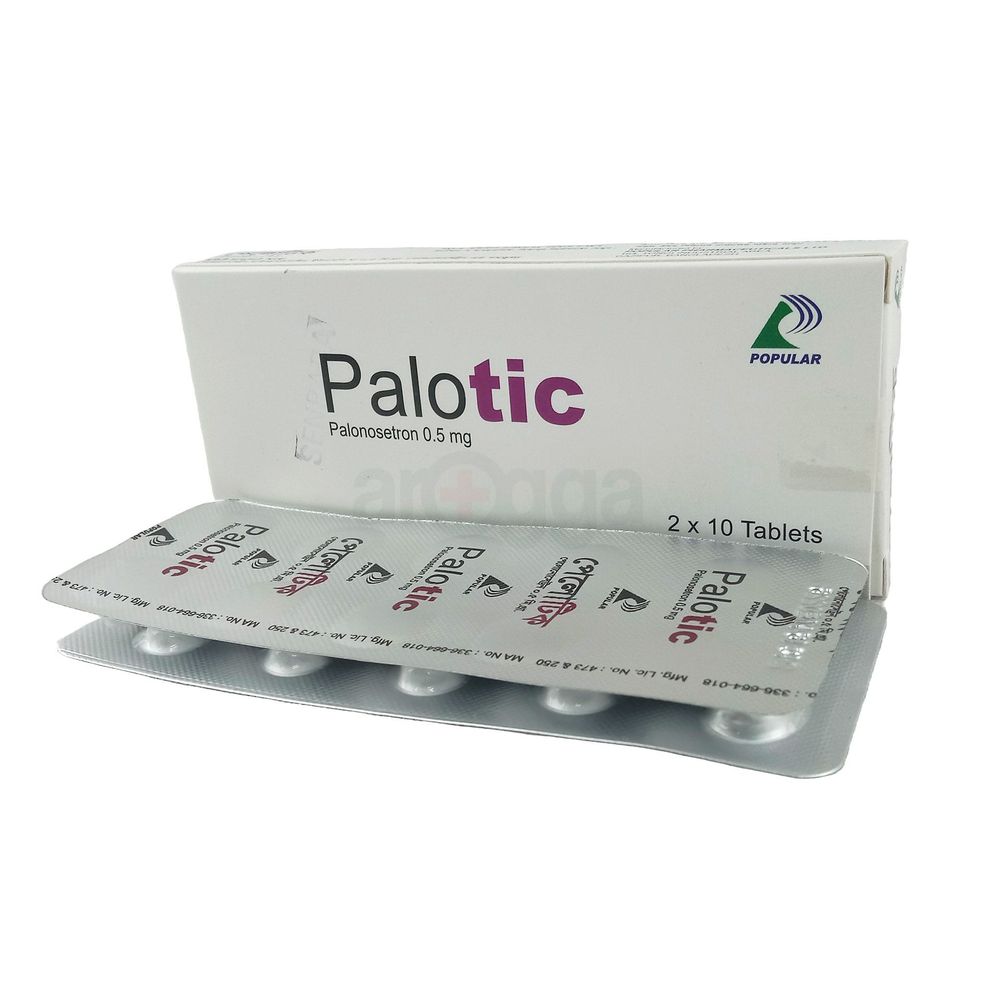

12-24 Hours
ব্যবসার জন্য পাইকারি দামে পণ্য কিনতে রেজিস্টেশন করুন
Register
0 People recently viewed this
Palotic
Popular Pharmaceuticals Ltd.
Generic: Palonosetron
Safety Advices
বাংলা
English
CONSULT YOUR DOCTOR
It is not known whether it is safe to consume alcohol with Palotic. Please consult your doctor.
SAFE IF PRESCRIBED
Palotic is generally considered safe to use during pregnancy. Animal studies have shown low or no adverse effects to the developing baby; however, there are limited human studies.
SAFE IF PRESCRIBED
Palotic is probably safe to use during breastfeeding. Limited human data suggests that the drug does not represent any significant risk to the baby.
UNSAFE
Palotic may decrease alertness, affect your vision or make you feel sleepy and dizzy. Do not drive if these symptoms occur.
SAFE IF PRESCRIBED
Palotic is safe to use in patients with kidney disease. No dose adjustment of Palotic is recommended.
SAFE IF PRESCRIBED
Palotic is safe to use in patients with liver disease. No dose adjustment of Palotic is recommended.
Medicine Overview of Palotic 0.5mg Tablet
Introduction
Palotic is an antiemetic medicine commonly used to control nausea and vomiting due to certain medical conditions like stomach upset. It is also used to prevent nausea and vomiting caused due to any surgery, cancer drug therapy or radiotherapy. Palotic will not relieve other side effects associated with cancer treatments. It also has little effect on vomiting caused by motion sickness. You should take this medicine in the dose and duration advised by your doctor. But, it is better to take this medicine at a fixed time. Remember you should not stop taking the medication suddenly without talking to your...
... Show moreUses of Palotic
- Nausea
- Vomiting
Side effects of Palotic
Common
- Headache
- Constipation
How to use Palotic
Take this medicine in the dose and duration as advised by your doctor. Do not handle the tablets with wet hands. Put it in your mouth but do not swallow it. Palotic may be taken with or without food, but it is better to take it at a fixed time.
How Palotic works
Palotic is an antiemetic medication. It works by blocking the action of a chemical messenger (serotonin) in the brain that may cause nausea and vomiting during anti-cancer treatment (chemotherapy) or after surgery.
What if you forget to take Palotic?
If you miss a dose of Palotic, take it as soon as possible. However, if it is almost time for your next dose, skip the missed dose and go back to your regular schedule. Do not double the dose.
Quick Tips
- You have been prescribed EME OD Tablet MD for prevention of nausea and vomiting caused after surgery or due to chemotherapy and radiotherapy.
- Unlike some other nausea medicines, the side effects for EME OD Tablet MD are relatively mild.
- It is fast-acting and starts working within 30 minutes.
- If you vomit within one hour of taking a dose, take another dose.
- Avoid heavy meals and try eating small nourishing snacks throughout the day. Also, sip water regularly to help avoid dehydration.
Brief Description
Indication
Chemotherapy-induced nausea and vomiting, Postoperative nausea and vomiting
Administration
Reconstitution: Physically and chemically stable at concentrations of 5 and 30 mcg/ml in glucose 5%, sodium chloride 0.9%, glucose 5% in lactated Ringer's for at least 48 hr at room temperature, exposed to light and for 14 days under refridgeration.
IV Administration
Flush IV line with NS before and after administration
CINV: give IVP evenly over 30 sec (adults) or 15 min (children)
PONV: IVP over 10 sec
Adult Dose
Prevention of Chemotherapy-induced Nausea & Vomiting
Intravenous
Adult: 0.25 mg IV as a single dose. To be given over 30 sec and 30 minutes before chemotherapy. Do not repeat within 7 days.
Oral
Alternatively 0.5 mg tablet/capsule approximately 1 hour before the start of chemotherapy. Then 0.5 mg tablet once daily.
Prevention of Postoperative Nausea & Vomiting
Adult: 0.075 mg IV as a single dose immediately before induction of anaesthesia.
Hepatic impairment: Dose adjustment not necessary
Child Dose
Prevention of Postoperative Nausea & Vomiting
<18 years: Safety and efficacy not established
Prevention of Chemotherapy-induced Nausea & Vomiting
<1 month: Safety and efficacy not established
1 month to 17 years: 20 mcg/kg IV infused over 15 minutes x1, beginning 30 minutes before chemotherapy; not to exceed 1.5 mg/dose
Renal Dose
Renal impairment: Dose adjustment not necessary
Contraindication
History of hypersensitivity.
Mode of Action
Palonosetron is a selective 5-HT3 antagonist that is used in the prevention of acute and delayed emesis in emetogenic cancer chemotherapy regimens.
Precaution
Patients with intestinal obstruction or ileus. Rapid inj may lead to temporary visual changes e.g. blurred vision. Patients who have or may develop prolonged QT intervals. Safety and efficacy not established in children <18 yr. Counsel patients who handle skilled tasks e.g. driving may be impaired.
Lactation: unknown, discontinue drug or do not nurse
Side Effect
1-10%
Prolonged QT interval (up to 5% ),Anxiety,Dizziness,Headache,Weakness,Constipation,Diarrhea,Prutitus,Hyperkalemia,LFT's increased
<1%
First degree atrioventricular block,Second degree atrioventricular block
Frequency Not Defined
Immune hypersensitivity reaction (very rare),Seizure
Interaction
May have additive effect on prolonging QT with drugs e.g. moxifloxacin, erythromycin, antipsychotics and TCAs.
ব্যবসার জন্য পাইকারি দামে পণ্য কিনতে রেজিস্টেশন করুন
Register